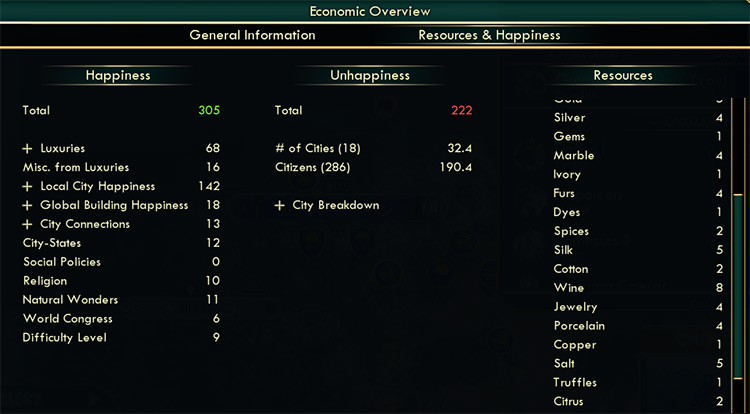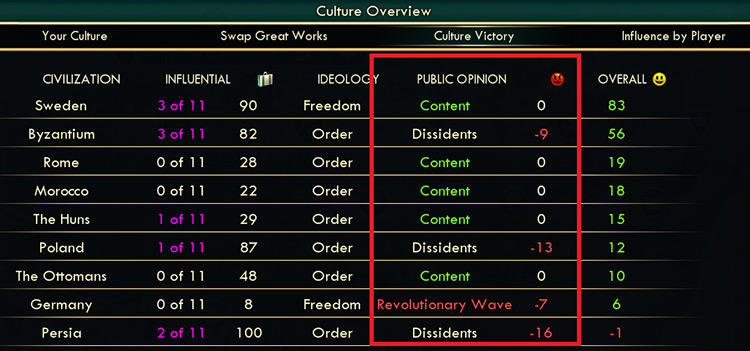Types of Happiness
Happiness comes in two types: Global and Local.
Global happiness always applies to your entire civ. It doesn’t have any restrictions. Local happiness is generated by your cities, which mostly comes from their buildings. Each city’s contribution is restricted by their population.
This means that even if they produce a lot of happiness, the actual amount that reaches you can’t be higher than the city’s population (pop) size.
Sources of Happiness
1. Difficulty Setting
You start with a fixed amount of happiness depending on your difficulty: For Settler and Chieftain, they gain an additional 1 happiness per luxury.
2. Luxuries
Each unique luxury provides 4 global happiness. You only need one supply of the resource. Surplus luxuries can be traded to other nations for other luxuries and/or gold. Allied city-states provide one luxury. Mercantile city-states give you two luxuries, one of which is available only to them.
3. Happiness Buildings
These buildings produce local happiness in their cities:
4. World and National Wonders
Wonders can either provide global happiness or local happiness depending on their effect.
5. Natural Wonders
You get 1 global happiness for every Natural Wonder discovered. This is a permanent boost.
Must be built on a coastal city
Some Natural Wonders also provide local happiness if they’re worked by a citizen in a city.
6. Social Policies
Almost every social policy tree has one policy that affects happiness.
7. Ideologies
All three ideologies have tenets which generate happiness.
Causes of Unhappiness
1. Number of Cities
Each city starting with your first creates unhappiness. The amount scales with your map size:
2. Annexed or Razed Cities
Occupied cities have higher unhappiness than normal cities depending on your map size: This increased unhappiness can be normalized by building courthouses. In cities being razed, their unhappiness decreases every turn until they’re completely demolished.
3. Population Size of Cities
Every pop (citizen or specialist) generates 1 unhappiness in cities that you own or have puppetted. For occupied cities, they create 1.34 unhappiness instead.
4. Influence from Opposing Ideologies
When ideologies come into play, your civ’s happiness will start getting affected by other civs of opposing ideologies. Your outgoing influence (based on your tourism stat) will be compared to the incoming influence from other civs with different ideologies. Whoever has the higher influence burdens the other with ideological pressure. This pressure gets stronger as the gap between your influences gets larger. Ideological pressure causes discontent in your civ. It affects the public opinion on your chosen ideology. As your public opinion decreases, it eventually creates unhappiness. This gets more severe the lower your public opinion drops. The best way to counter this is to increase your culture output. Culture acts as your shield against influence. By reinforcing your culture, you’re preventing ideological pressure from attacking your public opinion.

